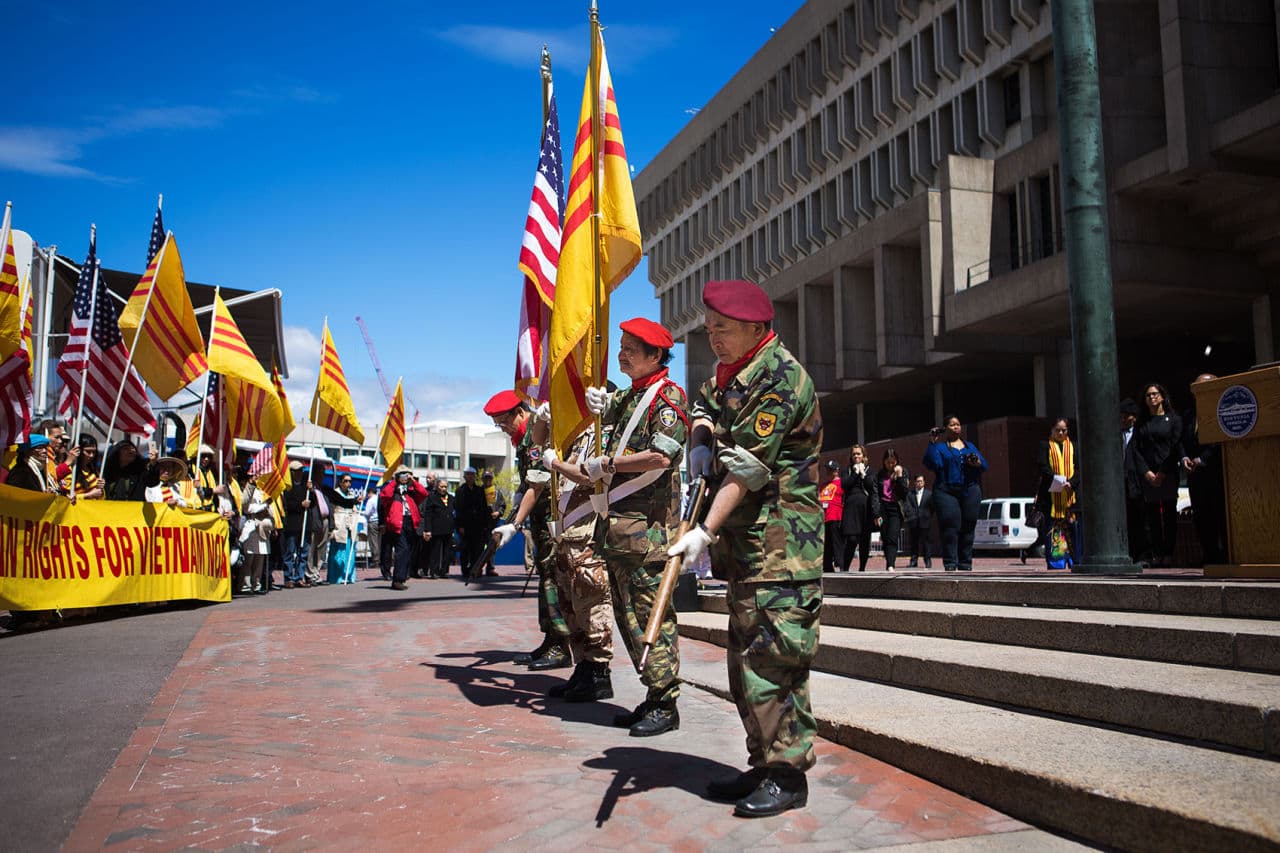Advertisement
40 Years After Saigon's Fall, Dorchester's Vietnamese Community Recalls Loss, Opportunity
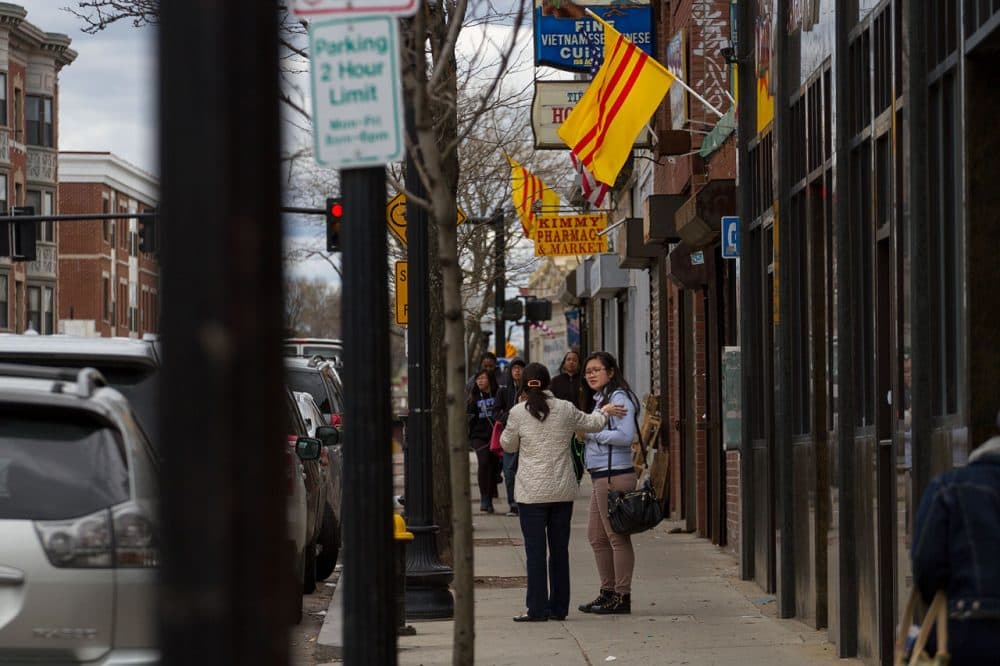
Today, as you turn off of Columbia Road and head down Dorchester Avenue through Fields Corner, yellow and red South Vietnamese flags fly outside buildings up and down the street. Some are always there, but many have been brought out in the last couple of weeks ahead of the 40th anniversary of the fall of Saigon.
"The flags are a reminder that we are South Vietnamese, not North Vietnamese," said Mary Truong, 54, whose family came here when she was a child.
Forty years ago today, on April 30, 1975, thousands of South Vietnamese fled the country after North Vietnamese forces captured Saigon — now Ho Chi Minh City — marking the end of the Vietnam War.
Many of those refugees ended up right here in Boston. Some came in 1975; others did not escape Vietnam until much later. In the past few decades a vibrant Vietnamese-American community has sprung up in the Fields Corner area of Dorchester.
April 30 is a day of many meanings for Vietnamese. In Vietnam, many celebrate it as Reunification Day, while many Vietnamese here see it as a sad reminder of when they lost their country.
"Obviously for those who are older and were a part of the Vietnam war, it is a sad time to reflect on the loss," said Mary Truong's younger brother, Van Truong Le, now the interim director of VietAID, an organization that provides socials service to the local Vietnamese community.
Van Truong Le And Mary Truong — 'A Time To Be Grateful'
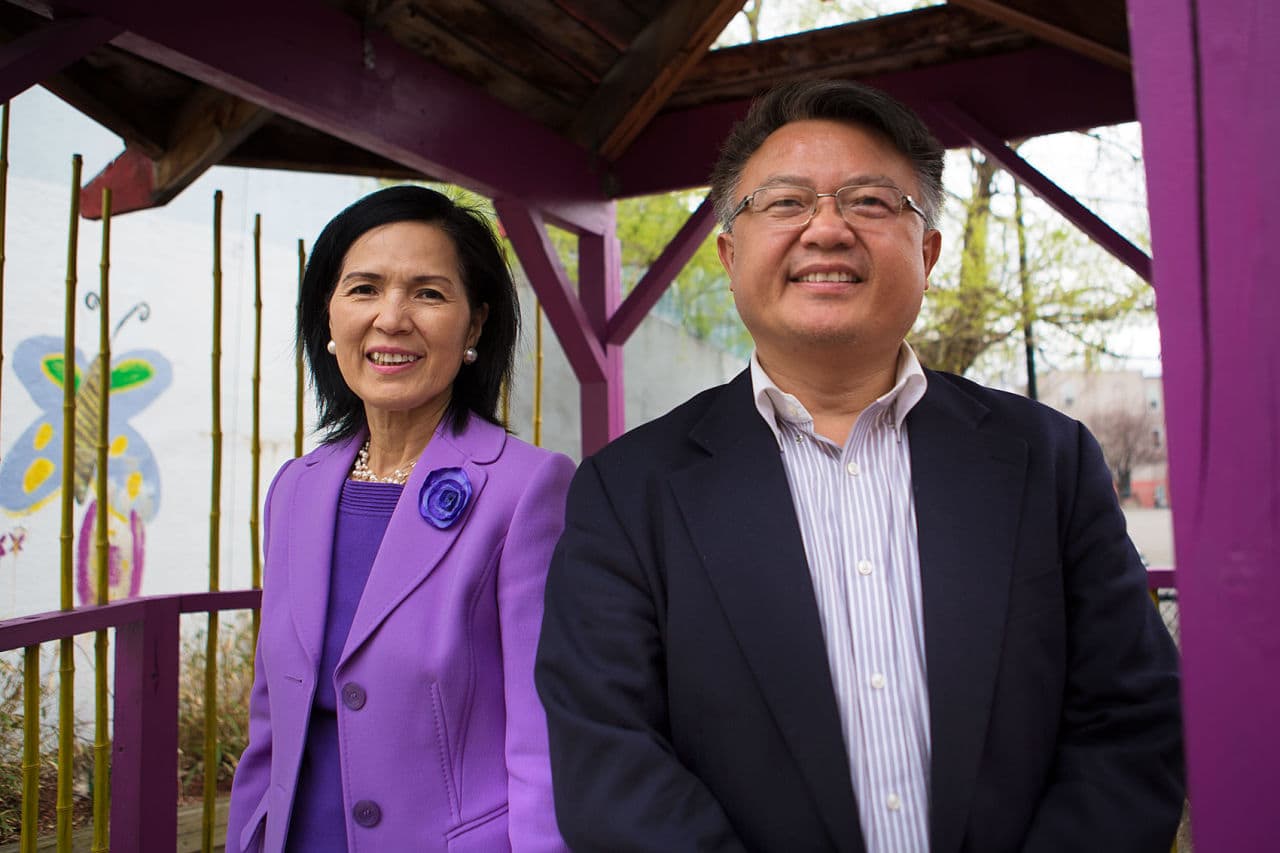
Le said April 30 is called "Black April," “but for folks like myself who've been here for the last 40 years, it's also a time to be grateful and to really celebrate in the freedoms and the opportunities here."
Le and Truong escaped Vietnam in 1975 with their father and seven other siblings. “My father was so determined to take all of us to leave Vietnam by any possible means,” Truong said.
Le was 8 years old and Truong was 14 at the time. Their mother had died two years earlier from complications from a gunshot sustained in an attempted attack on their father, a wealthy anti-communist who sold lumber and sugar and did business with Americans.
“War was all around us, but I was too young to understand it,” said Le, who was also wounded in the attack.
Their family left Saigon the day it fell to the North Vietnamese. Le’s memories from that time are vivid.
“There were a lot of gunfire, rockets and explosions,” he said. “There were dead bodies on the streets. There were abandoned buildings and homes.”
Their story of escape is filled with close calls and luck. At one point their vehicle was searched at a checkpoint, where a guard found their father's journal but quickly tossed it aside. Truong said her father then gave the man his Rolex watch and he let them pass through.
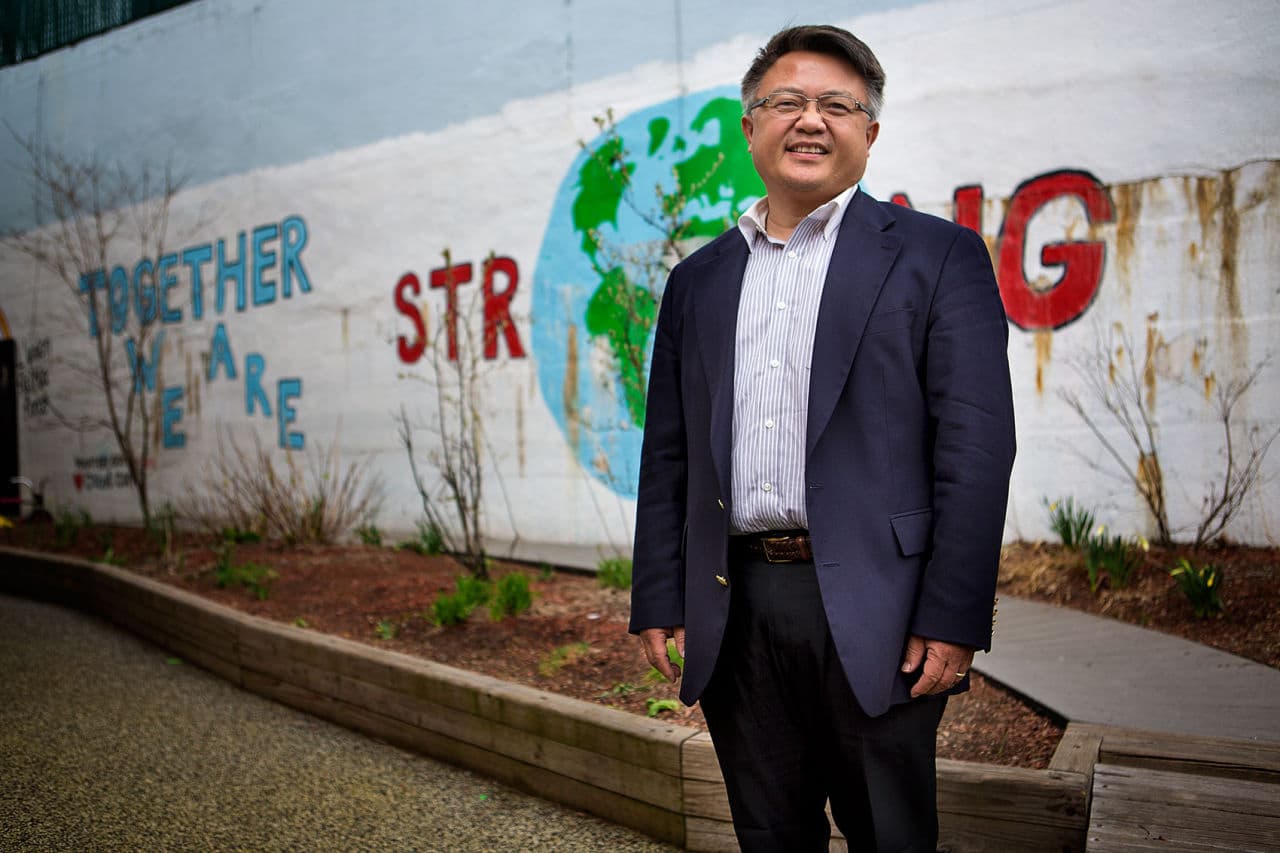
Eventually, the family made it onto a boat and were at sea for several days before landing in the Philippines. Months later, they came to the U.S. with the help of an American Army doctor who had treated their mother years earlier, after her gunshot injury.
The family ended up in Indiantown Gap, a refugee camp in Pennsylvania. Those early years in the U.S. were challenging. A wealthy businessman in Vietnam, their father became a janitor as he struggled to find work.
“It makes me emotional when I still think about it because I used to see him carrying folders of paper and giving people instructions at his sugar cane factory where he was the boss ... to holding a mop and mopping the floor in the Frick Museum [in Pittsburgh],” Le said.
The family moved and spread out a bit before coming to Boston. Today, six of the nine siblings are in Boston, while two live in California and one lives in Washington, D.C. Their father passed away about two months ago.
Le was recruited to a private high school, then he attended Harvard and Northeastern law school. He's a lawyer in addition to his work at VietAid. Truong went to Northeastern and is now director of patient relations at DotHouse Health. She also does community work — including raising money for the Vietnamese American Community Center.
“We are very proud of the community center,” Le said. “It was the culmination of several years and a lot of generosity on the part of many different groups and also the city.”
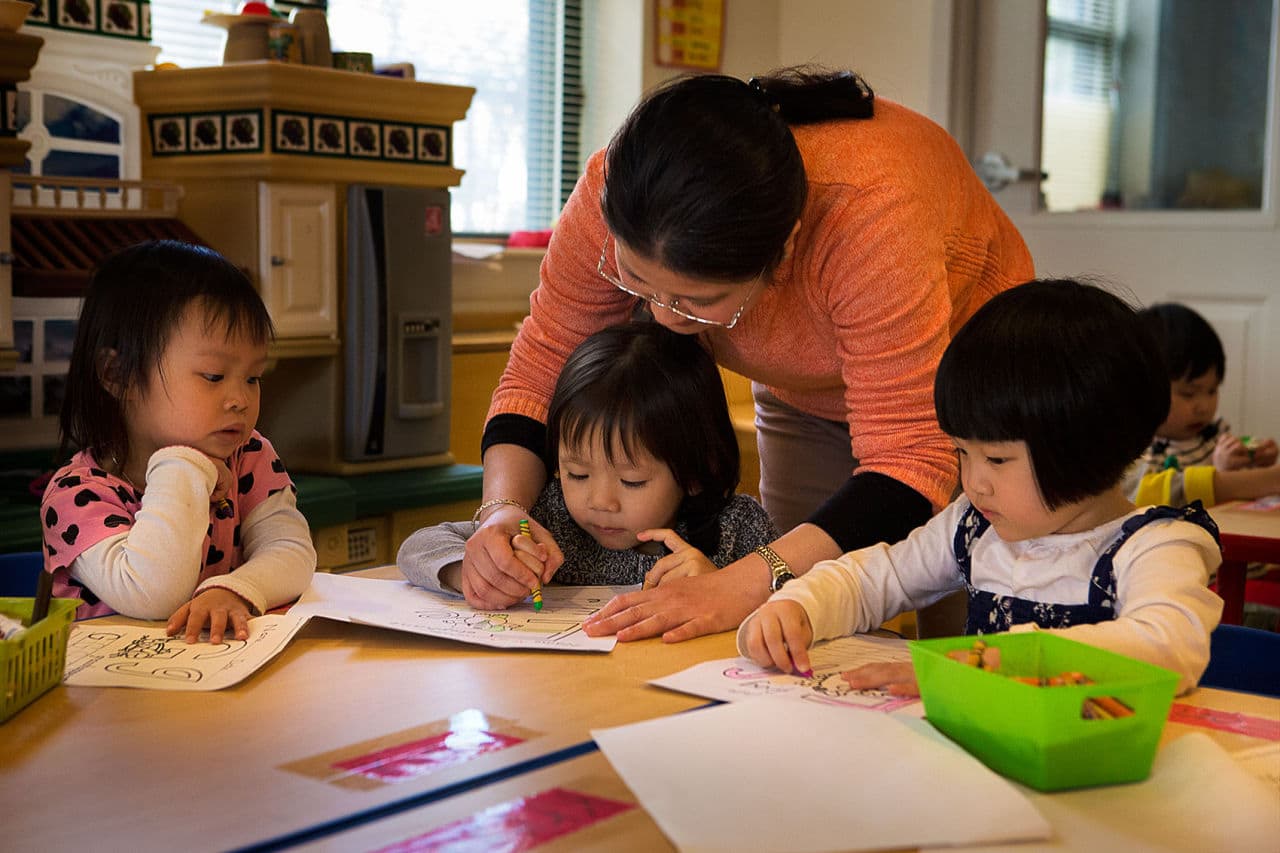
The center opened in 2002 and while it serves local Vietnamese, it also strives to serve the diverse community in Fields Corner, Le said.
Truong and Le feel fortunate for the opportunities they had in Boston and now want to pay it forward.
Le is also quick to point out that there are still challenges — poverty, youth crime, drug abuse — that the Vietnamese community faces, especially among those who came to the U.S. more recently.
“We still have the challenges that any newcomer, ethnic group faces when they come, which is problems of access and they are compounded by problems of language in our case,” Le said. "I want to do just my little share of help because I benefited a lot I think.”
Duyen Van Le — 'Our Community Here Is Very Strong'
Just steps away across the street from where Truong works is Pho Le, a Vietnamese restaurant. On a recent afternoon during lunchtime, groups of customers slurped down large bowls of the restaurant’s specialty — Pho (as the name indicates), a noodle soup.
Restaurant owner Duyen Van Le has a different story of coming to the U.S. “I tried to escape from my country many times. I was put in jail, my wife was put in jail ... but finally we did it successfully,” Le said.
He was in jail for one year and had to do hard labor. After he got out of jail, Le worked a number of jobs to support his family. He was an elementary school principal, but was fired after officials discovered he had been a South Vietnamese soldier, he said. He then worked as a barber, a carpenter and then got into business, transporting vegetables from Dalat City, where he lived, to Can Tho in southern Vietnam.
It wasn't until 11 years after the fall of Saigon, in May 1986, that Le was able to get out. He was 36 at the time. “It’s very hard to build our future so that’s why I decide to leave Vietnam,” he said.
Like others, Le left Vietnam by boat with his wife, two young children and a niece. (He later had a third child in the U.S.) They were at sea for about five days before arriving at Pulua Bidong, a Malaysian island. In March 1987, Le’s family was sponsored by a Catholic church in Grand Rapids, Michigan, to come to the U.S.
“We came here with nothing, only $20 in the pocket that my friend send it from here to [the] Philippines to help me,” he said.
He said members of a local church helped his family with everything from clothes to housing.
“I never thought that I came here with the big warm welcome like that,” he said. “They try to help us … to build our lives.”
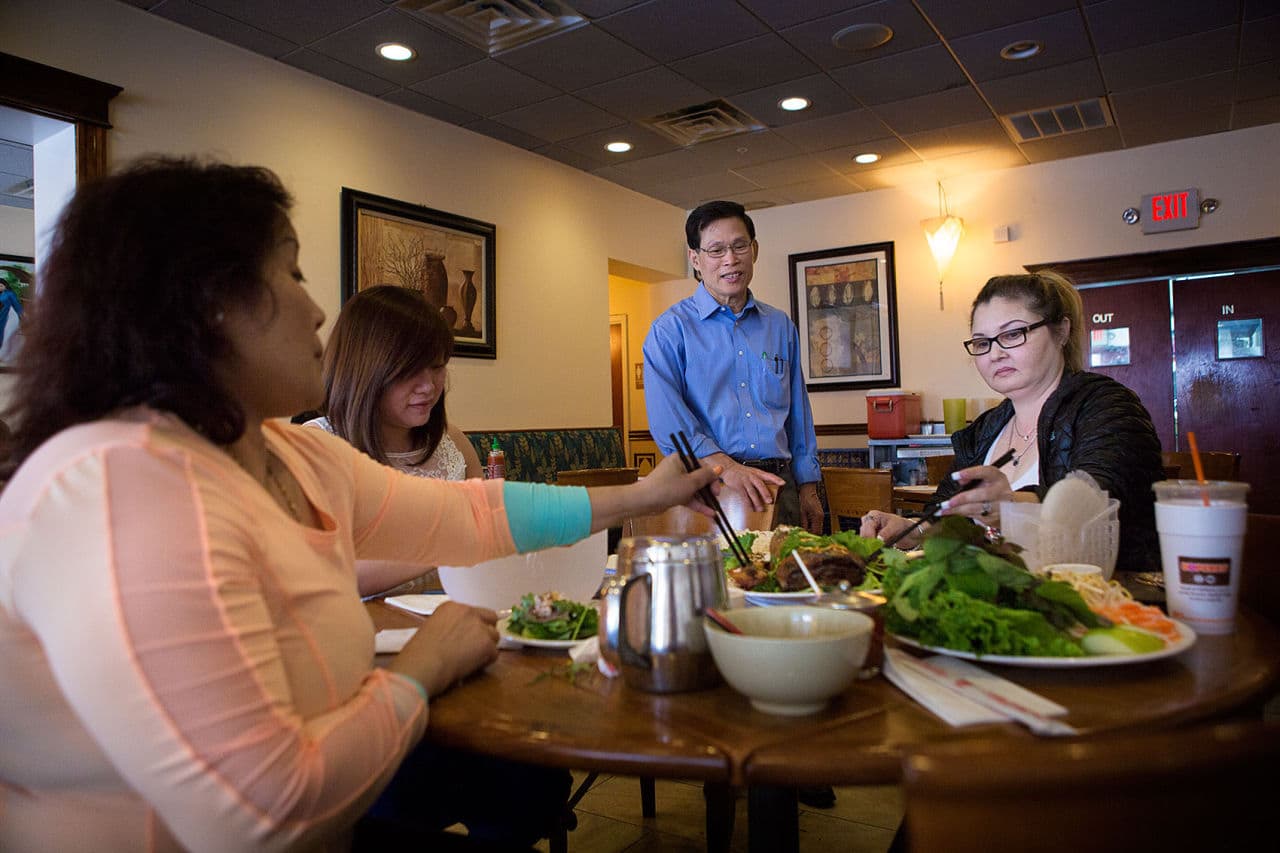
Le moved to Boston in 1987 after a friend in the area encouraged him to come. The family settled in Dorchester. He went to UMass Boston and studied computer science, but always planned to get back into business. In 1991 after he finished school, he borrowed money from friends and bought a tiny restaurant in Chinatown that he named Pho Pasteur.
Today, Le runs three restaurants — Pho Le in Dorchester, Le’s restaurant in Harvard Square and Le’s Vietnamese Cuisine in Allston. His two oldest children help run the Allston restaurant while his wife helps run the Harvard location. He sold that first restaurant years ago to a friend.
Le now lives in Weston, but spends 14-15 hours a day, seven days a week in his Dorchester restaurant, which he has run for four years.
“I love working,” he said. “A lot of people ask me, ‘How come you work so hard?’ I say to them because I love it. Whenever you love it, you don’t feel tired.”
While Le has built up his business, his relatives in Vietnam have also been able to build their own successful businesses, he said. Except for an older sister who's in Dorchester, his other siblings and relatives live in Vietnam.
“Before it’s very hard to do business [in Vietnam], but now they’re open,” he said.
Le said he's proud of what he has been able to accomplish in the U.S. and the local Vietnamese community has been very supportive.
“Our community here is very strong,” Le said. “We try to build up Dorchester to make it better.”
Jennifer Nguyen — 'We Have To Give Back To The Community'
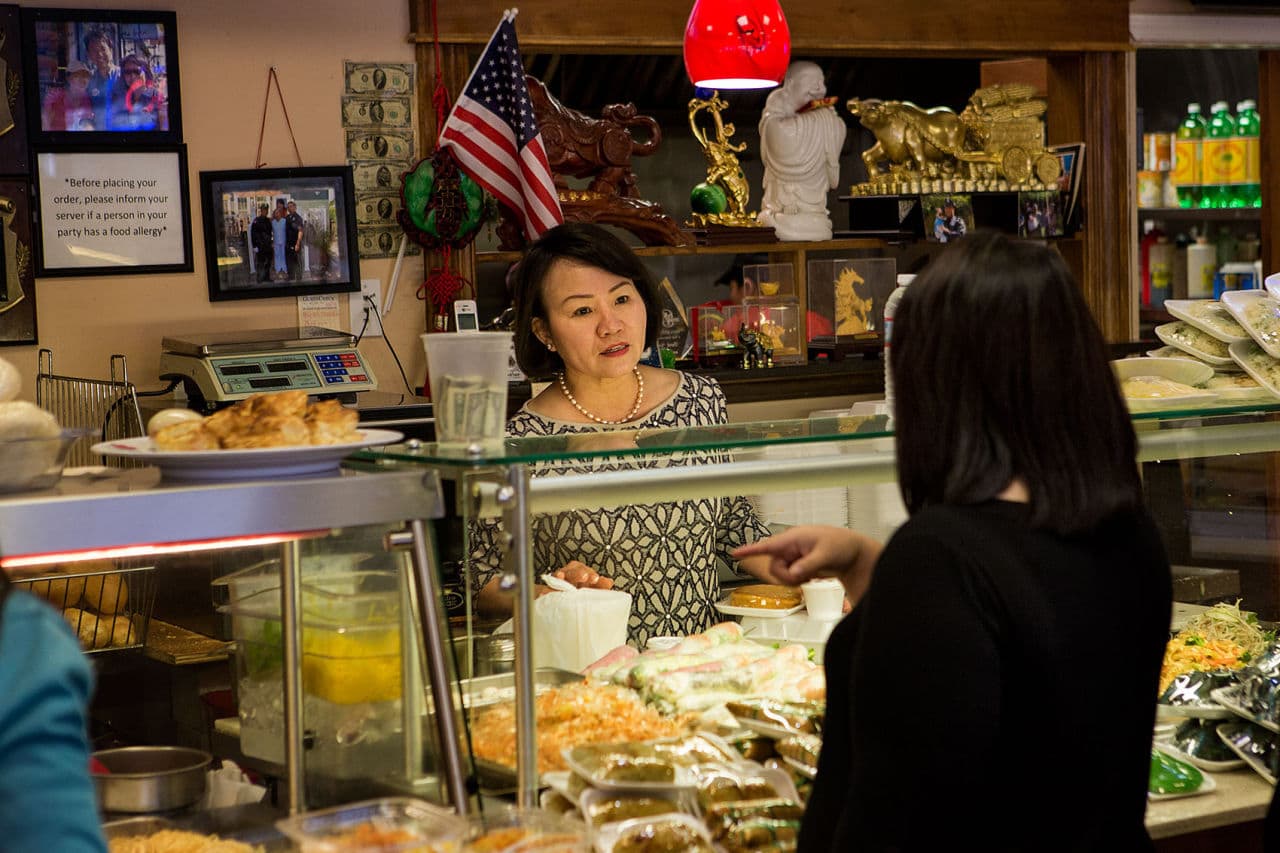
That sense of community is also felt further down Dorchester Ave. between Pearl and St. William streets at Banh Mi Ba Le, a sandwich shop and market where customers line up to get their well-known Vietnamese sandwiches (called banh mi). Owner Jennifer Nguyen is busy floating back and forth across the shop, helping take sandwich orders and making fresh juices at another counter. She chats with customers; many of them are regulars and some have come in from Maine and Worcester and other places for her sandwiches. Several customers walk out with bags stuffed full of sandwiches to take back to co-workers or their family.
“I see customers come back like five times a week,” Nguyen said.
In Vietnam as a teen, Nguyen sold watermelons at roadside markets as her family struggled to make ends meet after the fall of Saigon. Today, Nguyen, 54, serves up fresh watermelon juice and smoothies and sometimes runs out of the 400-600 banh mi sandwiches made in her shop each day.
Like Le, Nguyen wasn’t able to escape Vietnam in 1975. Her family didn’t make it out until 1981. In the meantime, they did whatever they could for work.
“Before 1975 my family had a small restaurant on Cam Ranh Bay,” she said. “After that the communists took over so my family left — everything gone. We just come home and lived with my grandmom out of the town. So by this time me and my whole family, everybody had to work.”
That’s when Nguyen began selling watermelons. She was about 16 at the time. Her mother sold tomatoes and her father began fishing to try to make money. All the while, her mother kept looking for opportunities for them to leave Vietnam.
Nguyen said her parents' hard work has stayed with her. When she thinks about her father, who served in the South Vietnamese army, she tears up. He didn’t have a boat, she said, so he would walk along the water to try to catch fish.
“I really remember after 1975 when the communists come in and my father had nothing for us to live,” she said. “I remember my father had to wake up every night, he had to go fishing to ... try to make money so the whole family can survive. It’s very tough.”
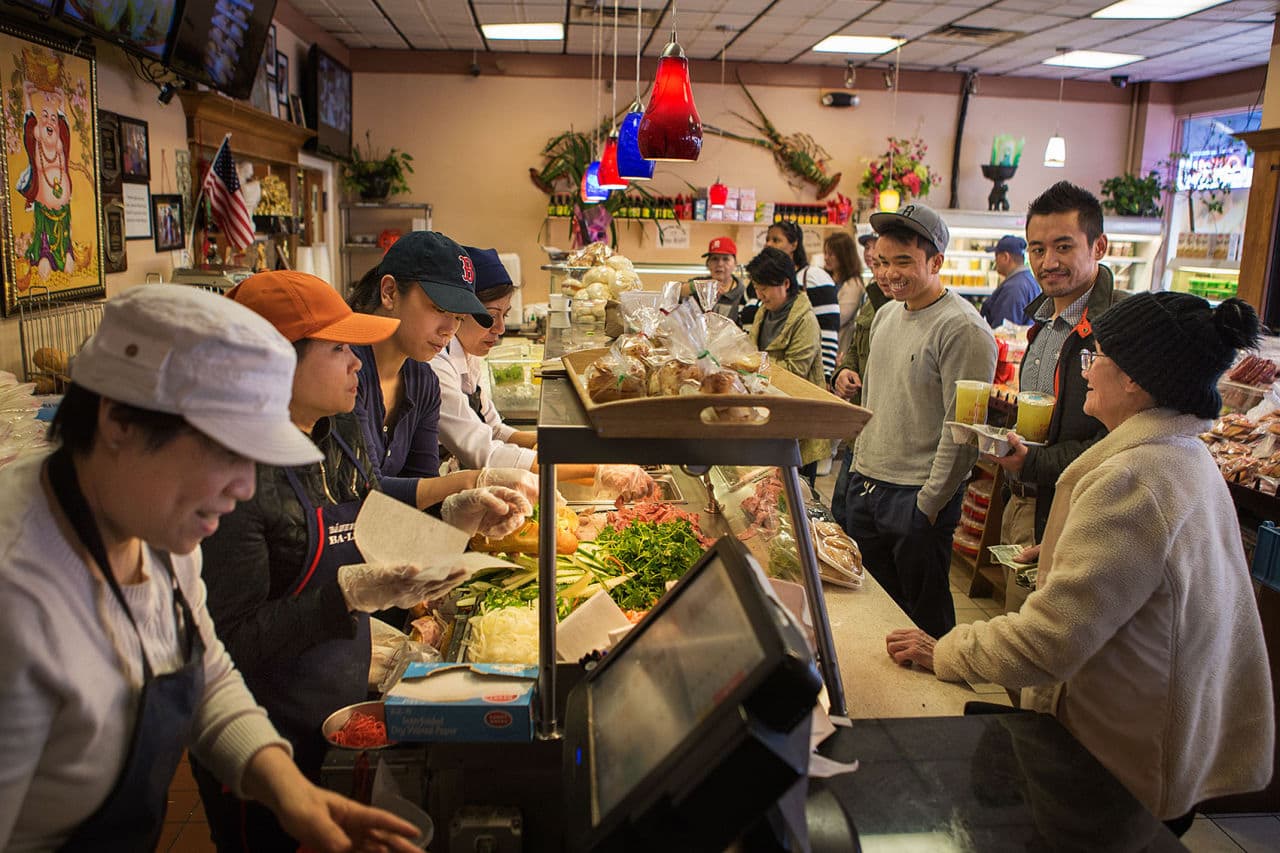
In 1980 two of her sisters managed to leave Vietnam and made their way to Boston. A year later in 1981, Nguyen and the rest of her family were able to leave by boat. She was married by that time and had a baby. After about 10 days at sea, they ran out of food.
“This time I remember my first son [was] only 6 months,” she said. “He have no milk, no water, I had to give him my spit for [him to] survive.”
Nguyen said they got lucky and were rescued by Chinese fishermen who brought them to Hong Kong. In January of 1982, her family came to the U.S. and settled into her older sister's Dorchester apartment.
Within a few years, Nguyen was a busy mother of four, but got divorced in 1994. She began working with her sister, who owned Ba Le, and took over the shop in 2001. Since she wasn't able to go to school she felt it was the best option to make a living.
“You have to work hard to do the right thing [so] your children can look up at you like I look up at my father right now,” she said.
Her father is back in Vietnam after he sustained a hip injury while visiting a few years ago. Besides two sisters, the rest of her family is in Boston. Nguyen has another sandwich shop in Quincy, where she now lives.
Today, Nguyen is happy tending to customers in her Dorchester shop and to be a part of the neighborhood.
“We know since we came here with nothing, we have to give back to the community,” Nguyen said.
